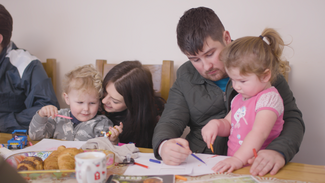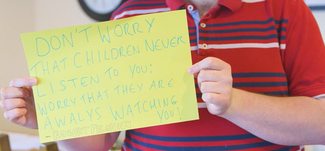Early Years Learning Part 2: Why a positive guidance approach to parenting?

Lisa Smith is a Global Leader for Young Children at the World Forum Foundation. As part of her early childhood advocacy project she ran a series of workshops in the heart of her local community. With the aim of equipping young Romani and Traveller parents and carers with knowledge of the science behind early childhood development.
We wanted to share our new knowledge with Travellers' Times readers and take you with us on our learning journey……..writes Lisa.
So far, using the Science of Early Childhood Development Toolkit we have looked at Brain development. This week we are going to look at a positive guidance approach to disciplining children and strategies to support this.
For a moment, imagine you are moving to a new town you have decided to hire a guide to help because you don’t know the language or where to go, where to stay or how to get around? What qualities would you expect your tour guide to have?
As a group we asked our self that same question. "I want mine to be able to tell me where to go and how to get around and he needs to be patient", said Lilly, "I want mine to tell us how to ask for something ", said John.
We realised being born is just like coming into a new place. Children don’t come into the world with knowledge on the rules or expectations but it is our job to teach them and guide them.
The world is loud and bright and there is so much to experience. Children want and need to explore the world and learn quickly and we are their tour guides helping them navigate the world.
Understanding young children's feelings and behaviours can make us more responsive to a child's needs and helps children to build control of their own behaviour and learn ways to handle challenging situations in life.
Discipline is what you do everyday – it is about teaching and guidance, not punishment. It teaches children what is acceptable and what isn’t and when it combines high levels of warmth and acceptance with firm control it helps children to follow instructions, to respect rules, and to be attentive.
Good discipline helps children develop their social skills (empathy, cooperation, problem-solving) and succeed in school. However, we looked at research that found children have a higher likelihood of developing behavioural problems when parents react with punishments or temper outbursts in face of misbehaviours
Young Children's relationships with the important people in their life's have a long lasting impact on their growing abilities to cope and be competent and a reactive approach like this can have a negative impact on a child and adult relationships.
We discussed how children are constantly copying us and learning from what they see us say and do.
Check out this powerful video that strongly makes this point and left us speechless.
We are all familiar with 'Don’t do that! Or Don’t Run!
But as part of exploring a positive guidance approach, we looked at turning Don'ts into Do's!
'Don't do that!' turned into 'Shall we do this instead' and 'Don't run!' turned into 'Please Walk'.
We practiced developing these positive statements in order to positively guide a child and help them understand what they can do instead of just what not to do to better. This develops their understanding of the world.
We caught up with Lilly mother of two a few weeks later to find out if she found this positive guidance plan useful.
"I found it was a simple strategy that my children reacted to well using do's instead of don'ts when talking to them it changed the way I thought about discipline, I don't feel like I'm telling them off all the time now!"
You can check out this website for parents and the section below for other ideas about strategies for a positive guidance approach
Did you know that all 3 and 4 year olds in England can get free early years education? and if your child is 2 years old they could be eligible for up to for 15 hours a week early years education in a nursery near you. To find out more and to check the structures if you live in Northern Ireland, Scotland or Wales visit Gov.uk.

Here are some everyday strategies that you can use!
Be a model
- Children are watching what we do and learning from us.
- Help children to learn to be kind and respectful towards others through your everyday behaviour.
Notice the positive
- Pay attention to children when they are doing good things.
- When a child helps someone describes to them what they said they did. For example, “That was nice to help your friend get up the steps”. This shows them the value of those behaviours and encourages children to repeat them.
Provide encouragement
- Encouragement focus children on their efforts and how they are feeling.
- It helps children think for themselves and evaluate their own actions
Offer choices
- It allows children to have some control and provides experiences in making decisions as they grow older.
- Be patient as children come to understand expectations. Be sure limits are reasonable and easy to understand.
- Use limits consistently to avoid confusion. Expect that children will need time and many reminders.
Look out for Part 3; The Power of Play